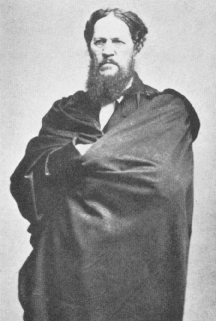In the days of daft adventurers, of fortune-seeking world-travelers and empire-founders — of “mad dogs and Englishmen” — one of the daftest was actually not English, but American. From Chester County. In fact, a Quaker born and raised just a couple of miles from my house in West Chester. To this day, he’s the only American to ever become monarch of a foreign country by right of conquest. (Some Quaker, huh?)

I first learned the story of Josiah Harlan, Prince of Ghor, at a West Chester Friends book sale. “Trust me, you want to read this”, teacher Ruth told me, and so I started reading the amazing story of a clasically-educated kid from a Philadelphia Quaker family who went to find his fortune in the Orient — and found it, alright.
Harlan had an amazing gift for talking his way into trouble. And out of it again, apparently — time after time, he would raise small, motley armies, march right into a valley where he should have been clobbered, and somehow manage to parlay his desperate situation into a sweet new caliphate. Or job. From Dost Mohammad Khan, he gained the title “Prince of Ghor”, a title that is (theoretically) still held by his descendants.
Not only was Harlan a fearless adventurer, he was apparently an amazing marketer. You can read all about it in the book Ben Macintyre wrote, available on Amazon.
Josiah Harlan was probably Rudyard Kipling’s inspiration to write his story “The Man who Would Be King“, which was in turn made into the epic movie by John Huston:
A story so amazing, so incredible, it took Rudyard Kipling, John Huston, Sean Connery, Christopher Plummer, AND Michael Caine to tell it all!
All this is astonishing. It became even more so when I read, in Ben Macintyre’s prologue, the source that uncovered this amazing story:
“In a tiny museum in Chester County, Pennsylania, I finally discovered Harlan’s Lost voice: an old box, buried and forgotten among the files, was a tattered manuscript handwritten in curling copperplate… unnoticed and unread since his death.”
Good heavens! Could Macintyre be talking about our very own Chester County Historical Society, the same place where I discovered a cannon manufacturer a few weeks ago? Yes, he was indeed. To what torch-lit depths had this intrepid biographer descended in order to find these forgotten dusty tomes? What ancient, crumbling chests had he pried open in search of these abandoned treasures?
Well. Diane Rofini, head librarian at the Chester County Historical Society, would like you to know that the manuscript is NOT “buried and forgotten”, thank you very much, it is carefully and neatly preserved in the stacks right under “H” where it belongs. In a clean, acid-free box, labeled and indexed. Here it is, right here:
I can’t fault Macintyre much for telling an Indiana Jones-style story when researching an Indiana Jones character, but it was a great opportunity for me to learn about the travails of the historical archivist. The archivist a person with an important job who is always having this same old story told about them. Journalists never write “archives”, they always seem to write “dusty archives.” Nobody ever says “preserved and protected in the files”, they always write “forgotten in the files”. Sheesh!
 My wife Kate, who is a Museum Person herself, explains to me that archivists don’t really work for you — they work for the future. An archivist’s sworn mission is to keep items in the same state, so that they’ll always be available to study. They’re like the history monks in the Discworld series, whose most important job is to make sure that history continues to exist.
My wife Kate, who is a Museum Person herself, explains to me that archivists don’t really work for you — they work for the future. An archivist’s sworn mission is to keep items in the same state, so that they’ll always be available to study. They’re like the history monks in the Discworld series, whose most important job is to make sure that history continues to exist.
Publicizing, educating, entertaining — the other parts of a museum’s mission are important and wonderful. But those things are not, like, the entire sacred duty of an archive. It’s also OUR job to get interested, to go in, to ask questions, and to be curious. Today was a wonderful example, for me. I emailed over and asked if I could see the Actual Manuscripts. “Yes indeed!” was the prompt answer. I had a GREAT time looking at Josiah Harlan’s stuff. It’s available at a moment’s notice — I’m not kidding when I tell you that Diane can put her hands on Josiah Harlan’s Persian manuscripts faster than I can find a stapler in my office. So my advice to you is — do you have tiny museum in your town? Go start asking questions — there’s no telling what mind-blowing things are carefully, neatly preserved, and yours to look at for the asking!


One response to “Mad Quakers and History Monks”
Yeah, this is pretty great. I’ve been trying to get V interested in Samuel Barber since he wrote her school’s alma mater and was, you know, famous. This area is rich with history. The Henderson HS site even has links to old yearbooks and other cool documents. Reading this inspires me to go to CCHS with a list of questions (okay, maybe over several trips).
LikeLike